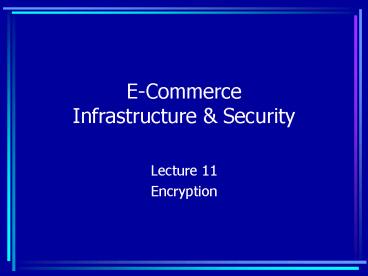ECommerce Infrastructure PowerPoint PPT Presentation
1 / 26
Title: ECommerce Infrastructure
1
E-CommerceInfrastructure Security
- Lecture 11
- Encryption
2
Agenda
- Project 4 Demos next Thurs.
- Proj 4 5 due next Thurs.
- Cryptography Basics
- Symmetric vs. Asymmetric Cryptography
- Attack Methods
- PGP
3
Crypto Basics
- Cryptography is thousands of years old
- Caesar Cipher based upon substitution
- AD, BE, etc.
- rot13 is a simple example of substitution
cryptography - V ybir vasbezngvba grpubaybtl
4
Weaknesses in Older Crypto
- Patterns are easily discovered
- Letters are not randomized
- Frequency of letters (esp. vowels)
- Strength of the crypto is insufficient given
modern computers - Cryptoquotes for example
5
Encryption Decryption
Encryption
Plaintext
Ciphertext
Crypto Algorithm
Decryption
6
Symmetric Crypto
- Also known as private key cryptography
- Both sender and receiver have same key
- Problems
- Securing the key
- Number of keys O(n2) so 100 people
communicating privately would need 10000 keys!
7
Symmetric Key Infrastructure
8
Asymmetric Crypto
- Also known as public key cryptography
- Sender and receiver have different keys
- Each has a public key and a private key
- Public keys are distributed via a KDC
- This scheme requires O(n) key pairs
9
Asymmetric Key Infrastructure
KDC
10
Public Key Cyrpto
Plain text
Encryptionwith Public KeyReceiver
Cipher text
Plain text
Decryptionwith Private KeyReceiver
11
How Public Key Crypto Works
- You get my public key from the KDC
- You encode a message to me using my public key
- Only my private key can unlock this
- I receive the message
- I decode it using my private key (that only I
have) - I can then read the message
12
Public Key Infrastructure
- Requires validation of keys
- Thus certificate authorities
- Public key certificate contains
- ID
- Identifying information (name, e-mail)
- Date created
- Certifying authorities (their signatures)
13
Public Key Encryption
Encrypted with Bobs Public Key
Encrypted with Alices Public Key
Alice
Bob
Message is Garbageto Third Party
14
Attack Methods
- Brute Force
- Requires recognition of plaintext
- Key length determines strength
- Cryptanalysis
- Mathematical attack
- Faults in system
- Hack into creator of the key pair
15
Attack Methods (cont)
- Factoring Attacks
- Security of asymmetric crypto resides in large
number theory - Its easy to generate a large composite number
(multiply two large primes) - But its (thought) difficult to factor these
16
Mathematical Underpinnings
- Pick two large primes
- P Q
- Pick another large number (e) which does not have
common factors with (P-1)(Q-1) - Public key PxQ e
- Private key e-1 mod ((p-1)(q-1))
17
Trap Door Theory
- Easy to create private key
- Difficult to reconstruct it
- Its easy to create the large number N
- But its difficult to factor it into P Q
18
An Example
- Took seconds to generate N 114,381,625,757,888,8
67,669,235,779,976,146,612,010,218,296,721,242,362
,562,561,842,935,706,935,245,733,897,830,597,123,5
63,958,705,058,989,075,147,599,290,026,879,543,541
(RSA-129, 1977) - But can you find the two primes P Q such that
PxQN?
19
In Case You are Wondering
- After 17 years, it took 8 computer months and
over 1600 computers working worldwide - P3,490,529,510,847,650,949,147,849,619,903,898,13
3,417,764,638,493,387,843,990,820,577 - Q32,769,132,993,266,709,549,961,988,190,834,461,4
13,177,642,967,992,942,539,798,288,533 - And this was only a 429-bit key youll be using
a key which is 2048 bits long (5 times as long)
which would require MUCH more time to decrypt
(about a million times more)
20
Publish or Perish?
- Should crypto algorithms be made public?
- Isnt the secrecy of the algorithm beneficial to
security? - How about a peer review process?
21
False Encryption
Falsely Encrypted
Falsely Encrypted
Alice
Bob
Carol
22
Current Technologies
- S/Mime - encrypted e-mail
- SSL - secure sockets layer for bi-directional
communication (web) - SET - secure credit card purchasing such that
merchant doesnt see card - SSH - secure shell like Telnet (putty)
23
PKI Digital Signatures
Plain text
Encryption of MDFwith Private KeySender
Plain text
Decryption of MDFwith Public KeySender
24
PGP
- Invented by Phil Zimmerman
- Originally released in 1991
- Used the RSA algorithm w/ legal issues
- Now it uses IDEA, CAST, and TripleDES
- Allows for variable crypto strengths
25
Key Strength
- Presumably, the larger the key, the harder the
crypto is to crack - Why not just make the key 100,000 bits or more?
26
Keep working on Project 4Dont forget Project 5
- PGP
FIN

